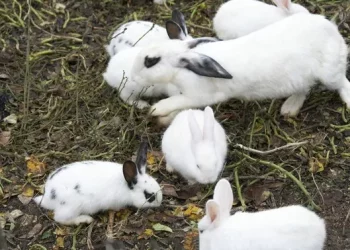Rabbits are beloved pets known for their gentle nature and unique dietary needs. A crucial component of a rabbit‘s diet is fiber, which plays an essential role in their digestive health. Understanding how digestible fibers are benefit rabbits, and how to incorporate them into a rabbit’s diet is fundamental for any rabbit owner. This article delves into the characteristics of rabbits, the importance of digestible fibers, and how to ensure that a rabbit’s diet meets their nutritional needs.
Introduction to Rabbits
Rabbits (Oryctolagus cuniculus) are small mammals that have been domesticated for centuries. They are characterized by their long ears, powerful hind legs, and a short, fluffy tail. Native to Europe and parts of Africa, domestic rabbits are now found in homes around the world, valued for their companionship and charming behaviors.
Physical Characteristics
Domestic rabbits come in a variety of breeds, each with distinct physical features. They can range from small dwarf breeds, such as the Netherland Dwarf, to larger breeds like the Flemish Giant. Despite these differences, all rabbits share a similar digestive system that requires a diet high in fiber to maintain optimal health.
Living Habits
Rabbits are herbivores and have a digestive system adapted to a high-fiber diet. In the wild, rabbits consume a variety of fibrous plant materials, including grasses, leaves, and bark. This diet helps them maintain proper digestion and prevent gastrointestinal issues. Domestic rabbits should have a diet that closely mirrors their natural feeding habits to ensure their health and well-being.
Digestible Fibers: What Are They?
Digestible fibers are an essential component of a rabbit’s diet. Unlike simple carbohydrates or proteins, fibers are a type of carbohydrate that cannot be broken down by enzymes in the stomach but can be fermented and utilized in the digestive tract.
Types of Fiber
Fibers are categorized based on their solubility and digestibility:
Insoluble Fiber: This type of fiber is not broken down by the digestive system and helps to add bulk to the stool, promoting regular bowel movements. It is found in the cell walls of plants, such as in hay and leafy greens.
Soluble Fiber: Soluble fiber can be fermented by the bacteria in the rabbit’s cecum (a part of the large intestine). It is found in fruits and some vegetables. While it is more digestible than insoluble fiber, it still plays a role in maintaining gut health.
Why Digestible Fibers Are Important
Digestible fibers are crucial for maintaining a healthy digestive system in rabbits. They facilitate several important processes:
Promoting Healthy Digestion: Digestible fibers help move food through the digestive tract and prevent gastrointestinal stasis, a condition where the digestive system slows down or stops functioning.
Preventing Obesity: High-fiber diets are often low in calories, helping to prevent obesity in rabbits. The fiber-rich diet ensures that rabbits feel full without consuming excessive calories.
Supporting Gut Flora: Fermentable fibers support the growth of beneficial gut bacteria, which are essential for a healthy digestive system and overall well-being.
The Role of Hay in a Rabbit’s Diet
Hay is a primary source of fiber in a rabbit’s diet and is essential for their health. Different types of hay provide varying levels of fiber, and selecting the right type of hay is crucial for maintaining digestive health.
Types of Hay
Timothy Hay: One of the most commonly recommended hays for rabbits, timothy hay is high in fiber and low in calcium, making it ideal for adult rabbits. It provides the necessary roughage for proper digestion and helps prevent obesity.
Meadow Hay: This type of hay is similar to timothy hay but often contains a wider variety of grasses and plants. It offers a diverse range of nutrients and fibers.
Alfalfa Hay: While rich in protein and calcium, alfalfa hay is generally recommended for young rabbits or pregnant/nursing females due to its higher nutritional content. For adult rabbits, it should be fed in limited quantities because excessive calcium can lead to health issues.
Hay Consumption and Digestibility
Rabbits should have unlimited access to hay at all times. Hay provides the necessary bulk for their digestive system, encouraging regular bowel movements and preventing the buildup of hairballs or other digestive blockages. Fresh hay should be available throughout the day to ensure that rabbits get enough fiber to support their health.
Fresh Vegetables and Fruits
In addition to hay, fresh vegetables and fruits can provide important fibers and nutrients for rabbits. However, it is crucial to select appropriate types and quantities of vegetables and fruits to ensure a balanced diet.
Vegetables
Leafy Greens: Vegetables like romaine lettuce, spinach, and kale are excellent sources of fiber. They should be included in a rabbit’s diet daily, with a variety of greens to ensure a range of nutrients.
Cruciferous Vegetables: Broccoli, cabbage, and Brussels sprouts provide additional fiber and nutrients. However, these should be introduced gradually, as they can cause gas and bloating in some rabbits.
Fruits
High-Fiber Fruits: Apples, pears, and berries can be offered as occasional treats. These fruits provide soluble fibers and essential vitamins but should be fed in moderation due to their sugar content.
See Also: Can Rabbits Eat Meadow Hay?
Serving Fresh Foods
When introducing new vegetables or fruits, start with small amounts and monitor your rabbit for any signs of digestive upset. Ensure that all vegetables and fruits are thoroughly washed and free of pesticides or chemicals.
Pellets and Their Role
Rabbit pellets are formulated to provide a balanced diet, but not all pellets are created equal. High-quality pellets should complement the high-fiber diet provided by hay and fresh vegetables.
Types of Pellets
High-Fiber Pellets: Pellets designed for rabbits should contain a high amount of fiber, ideally at least 18% crude fiber. These pellets help ensure that rabbits receive the necessary nutrients that may not be provided by hay alone.
Low-Fiber Pellets: Pellets with low fiber content can contribute to digestive issues and obesity. Avoid pellets that are high in carbohydrates or have added sugars.
Feeding Guidelines
Pellets should be fed in measured amounts according to the rabbit’s age, size, and health status. They should not replace hay but should be given in addition to a variety of fresh vegetables and hay.
Digestive Health and Troubleshooting
Despite a well-balanced diet, rabbits can experience digestive issues. Understanding the signs and taking preventive measures can help maintain their health.
Common Digestive Issues
Gastrointestinal Stasis: This condition occurs when the digestive system slows down or stops. Symptoms include reduced appetite, lethargy, and reduced fecal output. High-fiber diets, including ample hay, are crucial for prevention.
Diarrhea: Often caused by sudden dietary changes or overconsumption of sugary fruits, diarrhea in rabbits requires immediate attention. Maintaining a consistent diet and avoiding high-sugar treats can help prevent this issue.
Monitoring and Care
Regular monitoring of your rabbit’s fecal output and overall health can help identify potential digestive problems early. If you notice any changes in your rabbit’s eating habits, stool consistency, or behavior, consult a veterinarian for guidance.
Conclusion
Digestible fibers are a critical component of a rabbit’s diet, supporting their digestive health and overall well-being. By providing a diet rich in high-fiber hay, fresh vegetables, and fruits, and ensuring that rabbit pellets are high in fiber, owners can help maintain their rabbit’s health and prevent common digestive issues.
Understanding the role of digestible fibers and their impact on a rabbit’s health allows for better care and a more balanced diet. Through appropriate dietary choices and regular monitoring, rabbit owners can ensure their pets lead happy, healthy lives.
Related Topics:






















